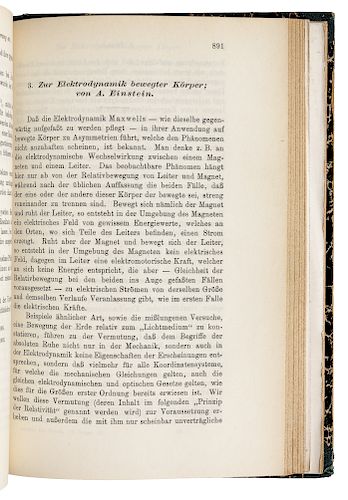EINSTEIN, Albert (1879-1955). "Uber einen die Erzeugung und Verwandlung des Lichtes betreffenden heuristischen Gesichtspunkt." -- "Uber die von der mo
Lot 33
About Seller
Hindman
1338 West Lake Street
Chicago, IL 60607
United States
Recognized as the Midwest's leading fine art auctioneers, Hindman Auctioneers has built a worldwide reputation based on a full service approach to the auction business tailored to meet the individual needs of our clients. Coming from a variety of educational backgrounds, specialists bring years of e...Read more
Categories
Estimate:
$5,000 - $7,000
Absentee vs Live bid
Two ways to bid:
- Leave a max absentee bid and the platform will bid on your behalf up to your maximum bid during the live auction.
- Bid live during the auction and your bids will be submitted real-time to the auctioneer.
Bid Increments
| Price | Bid Increment |
|---|---|
| $0 | $25 |
| $500 | $50 |
| $1,000 | $100 |
| $2,000 | $250 |
| $5,000 | $500 |
| $10,000 | $1,000 |
| $20,000 | $2,500 |
| $50,000 | $5,000 |
| $100,000 | $10,000 |
About Auction
By Hindman
Nov 5, 2019
Set Reminder
2019-11-05 11:00:00
2019-11-05 11:00:00
America/New_York
Bidsquare
Bidsquare : Library of a Midwestern Collector
https://www.bidsquare.com/auctions/hindman-auctions/library-of-a-midwestern-collector-4496
Hindman Bidsquare@hindmanauctions.com
Hindman Bidsquare@hindmanauctions.com
- Lot Description
EINSTEIN, Albert (1879-1955). "Über einen die Erzeugung und Verwandlung des Lichtes betreffenden heuristischen Gesichtspunkt." -- "Über die von der molekularkinetischen Theorie der Wärme geforderte Bewegung von in ruhenden Flüssigkeiten suspendierten Teilchen." -- "Zur Elektrodynamik bewegter Körper." Three articles in: Annalen der Physik, 4. Folge, Band. 17, 1905, pp. 132-148, 549-560, 891-921. Leipzig: Johann Ambrosius Barth, 1905.
8vo. Line-block and halftone text illustrations, one folding line-block table, 3 halftone plates, one collotype plate. Contemporary German quarter cloth (slightly shaken in binding); quarter morocco folding case. Provenance: H. W. Morse (stamp on front free endpaper); Joseph Henry Apple Library, Hood College, MD (gift bookplate from Richard C. McCurdy and stamps on text block edges).
FIRST EDITIONS, journal issues, of three important early papers by Einstein. In the first paper, "Einstein suggested that light be considered a collection of independent particles of energy, which he called 'light quanta.' Such a hypothesis, he argued, would provide an answer to the problem of black-body radiation where classical theories had failed, and would also explain several puzzling properties of fluorescence, photoionization and the photoelectric effect" (Norman). It was for this paper, together with one on the photoelectric effect ("Zur Theorie der Lichterzeugung und Lichtabsorption"), published in 1906, that Einstein was awarded the Nobel Prize in Physics in 1921. Norman 689; Weil 6.
The second paper proved, according to Einstein himself, that "according to the molecular theory of heat, bodies of dimensions of the order of 1/1000 mm. suspended in liquid experience apparent random movement due to the thermal motion of molecules. Such movement of suspended bodies has actually been observed by biologists who call it Brownian molecular movement" (quoted by R. W. Clark, Einstein, New York, 1984, p. 87). Experimental verification of the predictions made in this paper contributed to proving the physical reality of molecules. Norman 690; Weil 8.
The third paper, on the electrodynamics of moving bodies, was Einstein's first statement of the special theory of relativity. In it he argued that all motion is relative to the inertial system in which it is measured, and that matter and energy are equivalent. As he himself remarked, "it modifies the theory of space and time" (quoted by Clark, p. 87). Dibner Heralds of Science 167; Grolier/Horblit 26b; Norman 691A; Weil 9.
For condition inquiries please contact Gretchen Hause at gretchenhause@hindmanauctions.comCondition
- Shipping Info
-
Please refer to https://hindmanauctions.com/shipping-packing
-
- Buyer's Premium



 EUR
EUR CAD
CAD AUD
AUD GBP
GBP MXN
MXN HKD
HKD CNY
CNY MYR
MYR SEK
SEK SGD
SGD CHF
CHF THB
THB













